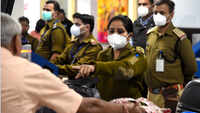Covid-19: Your mindset may make that virus seem riskier
As the viral infections spread across the globe, everybody has to make a decision: How worried should I be about getting infected, and what should I do about it? Some people are taking extra precautions, while others are just going about their daily lives. The right degree of concern for somebody who lives near a coronavirus hotspot might very well differ from that of somebody who lives far from one. "There are a lot of cognitive things that we use to gage risk generally that make this risk feel particularly scary. A new risk is always scarier than one we're familiar with because it has elements of the unknown. And not knowing what we need to protect ourselves leaves us feeling a little powerless and out of control," said risk expert David Ropeik. For example, it's new and unfamiliar, unlike the usual seasonal flu that kills a lot more people every year than coronavirus has. It doesn't appear to be fully understood. And it seems hard to control, either by public health authorities or our own actions. So how can people minimize the risk of overreaction in themselves and others? "We have to bear in mind that we have a responsibility to communicate with each other about the fear that we rightfully share in perspective to the risk. Not overblow it, just as much as we have to wash our hands and not sneeze on our friends. We're all in this together," said Ropeik.
 01:57
01:57 03:11
03:11 01:33
01:33 05:49
05:49 01:00
01:00